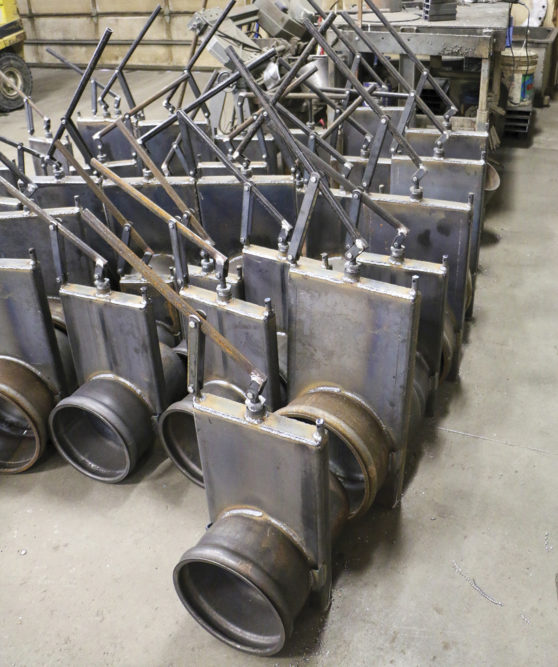Only in Idaho: Using farmer ingenuity, an irrigation valve was created that went on to become a family business.
“My dad invented an irrigation valve – a guillotine valve. The competition out there is a butterfly valve – and if you get any trash, debris or rodents in the pipeline, it clogs up,” says Dan Glodowski, owner of The Navigator. “Dad had a farm and needed something that would work better for him because rockchucks and skunks would get in the pipeline, so he figured there had to be a better way to make that valve work. He tinkered a lot, and there wasn’t anything he couldn’t fix,” Glodowski says. “That’s when he came up with the guillotine valve where it could be opened and the pipe could be flushed. He never intended for it to be a business, but he had a lot of requests for it, so he got a business license in 1986, and we’ve built them for 37 years now.”
The Navigator now produces about 2,000 patented units per year and wholesales them directly to dealers across about 12 states. “Wyoming is probably our biggest territory now, and Colorado is probably next. We sell by the hundreds into Wyoming. We have about 127 active dealers across the states,” he says.
While some of the manufacturing process is more automated now than it was in 1986, each piece is handled individually at different times during the process. “We cut and fab, build and paint almost every day,” Glodowski says. “We make them for 4-inch to 36-inch low-pressure pipes. Our main valve is for gated pipe, which runs 6- to 12-inch size. Then we make them for PIP [plastic irrigation pipe], IPS [industrial pipe] and OD pipe.”
 Dan Glodowski displays the original irrigation valve his father created when the business began. Photo by Lynn Jaynes.
Dan Glodowski displays the original irrigation valve his father created when the business began. Photo by Lynn Jaynes.
From gold fields to fish factories
The valve has come a long way since being used exclusively in irrigation. Today, one factory uses the valve in their carrot business, where they take full-size carrots and prep them for baby-carrot-size retail markets. In other industries, the units are used in fish farms, dog food factories (automated for use in filling dog food bags), mines in Alaska (using them in slurry water) and fish factories in Hawaii. The majority of their product goes out of state these days.
“We stamp each one with the year we make them, and then we guarantee them for five years,” Glodowski says. “With a stamp on them, I’ve seen some that were sent back to us were used for 23 or 24 years before they were rebuilt that were used in normal water conditions. If you get something that lasts 16 to 18 years outside, exposed to water, that’s a pretty good lifespan.” Many of the valves are used in dairy waste systems and, understandably, those units aren’t lasting as long as the irrigation valves. Irrigation valves are usually built with galvanized steel (at least the parts that move), but Glodowski also has a stainless steel option, which is what the dairies use.
“We’ve changed a few things about the first ones we built, but the basic design has not changed,” Glodowski says. “The depth of the mechanism or starter end was increased, for instance, and we’ve tapered male ends and added features to help keep a pipe from rolling.”
The business has been located in Jerome from its beginning. The original accompanying farm eventually went by the wayside. Glodowski was working in the airlines when his dad started the business. “I worked part-time for him for a few years and then full time in 1999,” he says. “Then in 2006, I bought him out. When I bought the business, we started making some other tools that could also help in the industry – pipe turners, kleats, end cap retainers, T-post pullers and a small valve expandable opener.” While they used to have other subcontractors make parts for them, Glodowski has now made the tooling to be able to make everything but one fitting in-house. “If you order from me, I want to send it to you today or tomorrow, but if I’m depending on someone else to supply a part, then I can’t do that,” he says, and that’s why he moved all fabrication to in-house.
But not all ideas have come to fruition. “I have ideas that have gone nowhere,” Glodowski says, “like ideas for things that people used but I couldn’t find a market demand for it. Building it’s easy – selling it’s hard. New items are hard to get into the marketplace and into common usage.”
The ag industry has seen major changes, and the business has had to adapt to remain relevant. “Gated pipe here used to be king, of course,” Glodowski says, “but now pivots have taken that place, so as the Idaho market decreased, we expanded into other markets, enlarging our footprint to make the business grow.” He says, “Honestly, everyone thought our business would be dead many years ago, but as big farms get sold to hobby farmers, the hobby farmers want everything the big farmer has. So one farmer sells to a hundred ‘farmers,’ and now you sell the same things 100 times over. So I think there will always be a need for it.”
Glodowski offers free freight on pre-orders if tied up by March 15, so the winter is a busy time for him and a full-time employee, running five days a week, where dealers order 150 or 200 valves at a time. Then the season slows a bit but heats up again by June, when irrigation water is running at full capacity.
The biggest pinch point, as might be suspected, is iron price. He says, “Three or four years ago it was costing 70 dollars per sheet, and now it’s costing 300 dollars per sheet for 14-gauge galvanized sheeting. Stainless, we’re paying 500 to 600 dollars per sheet. Then 12-inch pipe is 45 dollars a foot and 10-inch pipe is 21 dollars a foot, and we weren’t even paying half that four years ago.” He says, “You have to have a short pencil to make it work.” Two years ago, when prices and supply chain disruptions impacted the markets, he had to use surcharges. But since then, he’s pre-bought enough supplies to maintain his price list throughout the year without surcharges.
 Glodowski makes every part of the guillotine valve but one in-house. Photo by Lynn Jaynes.
Glodowski makes every part of the guillotine valve but one in-house. Photo by Lynn Jaynes.
One-off jobs
The business has further expanded through the years by taking on custom work. Bathroom stalls, countertops, signage, handrails, a heat exchanger for a shop, decorative coat racks or whatever people dream up. “Practical, artistic, it doesn’t matter. We’ll take on anything,” Glodowski says. “I tell people I have a fishing habit I need to support.”
He adds, “I used to do everything hand-drawn and hand-cut, but we have a computerized plasma cutter now where we can do about 80 percent of the work.” They also manufacture irrigation pipe trailers and large-bale hay forks for universal skid steer mounts.
Many of the youth in the community also know about The Navigator, although not necessarily through their work product. “I don’t remember how it started,” Glodowski says. “But for probably 30 years, we have provided the Jerome High School ag classes with metal for their welding classes. We have a cutout from the valve bodies, and I throw those cutouts in a 55-gallon drum. So, it’s all new metal, but it’s scrap from our products. The ag classes pick up the drum when they need metal and use those pieces for their welding tests and coupons. Then they return it to us when they’re done learning on it, and we recycle it from there.”
In addition, for Sleep in Heavenly Peace, a nonprofit company headquartered in Twin Falls that makes bunkbeds for kids, Glodowski makes all the brands and jigs for their worldwide chapters.
Anywhere throughout Idaho, Utah, Wyoming, Colorado, Nebraska and several other states, if travelers look along the roads at the canals and ditches, they’ll see The Navigator irrigation valves everywhere. Even a quick drive from Jerome to Jackpot will net 75 or more sightings. What started as “only in Idaho” sightings has now successfully become “look for them everywhere.”








